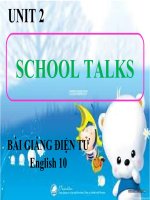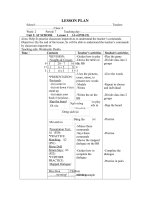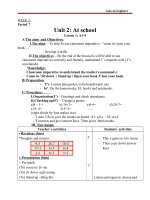Giáo án Tiếng Anh 10 Unit 2: School talks
Bạn đang xem bản rút gọn của tài liệu. Xem và tải ngay bản đầy đủ của tài liệu tại đây (319.98 KB, 19 trang )
Tiếng Anh 10 – Giáo án
I. OBJECTIVES: After the lesson, the students will be able to talk about their
school and better their reading comprehension skill by doing true or false exercise and
answering questions.
II .TEACHING METHODS:
Communication method
III TEACHING AIDS :
English book, pictures, chalk, blackboard
IV. NEW LESSON: UNIT2 / LESSON1 / READING
Stages
Teacher’s activities
• Asks Ss to look at the book,
read some topics quickly.
Students’ activities
• Look at the book and read the
topics quickly.
• Work in pairs, discuss the
• Puts the question: When you
question.
meet your friend what do
you often talk about?
BEFOR
• Encourages Ss to talk about
E YOU
the topics which are not
READ
mentioned in the book such
as: fashion; food; holiday;
school…
• Calls on one pair to practice
asking and answering this
• Practise in pairs.
question in front of the class.
• Sets the scene: You are going to
• Listen to the teacher.
read three talks given by a
student, a teacher and a student’s
father about school. You read
them and do the tasks assigned.
• Plays the tape
• Listen to the tape
• Asks Ss to work independently
• Work individually
and fill each blank with one of
the words in the box.
• Has Ss compare the answers with
a friend.
• Compare with each other.
• Goes around and check.
• Introduces about gerund and to
infinitive.
- Like / Love / Enjoy + V- ing
• Listen to the teacher and copy
down.
I/ OBJECTIVES : After the lesson the students will be able to use common
expression in making small talks. Start and close a conversation.
II/ TEACHING METHOD
-Communicative method
III/ TEACHING AIDS
Textbook, small cards.
IV/ NEW LESSON: UNIT2 / LESSON2 / SPEAKING
Stages
Warm - up
Teacher’s activities
- Writes a short conversation on the
board and says: Suppose that you meet
a friend at the supermarket. You are
very busy. What will you say to open
and end the conversation.
A………………………………………
………………………(1)
B. Hi Lan, How are you?
A. I’m fine, Thank you! And you?
Students’ activities
- Look at the board and
listen to the teacher
B. I’m very well. Thanks! I haven’t
seen you for a long time. Let’s go
somewhere for a drink.
A. Sorry
………………………………………
……………(2)
- Work in pairs
- Asks Ss to work in pairs.
- One pair practices, other
- Calls on one pair to practice to the
pairs listen to.
class.
- Look at the book
Activity1
-Asks Ss to look at task 1 in the book.
Task1
- Has Ss work in pairs to put the
- Work in pairs
expression which are commonly used
in making small talks under appropriate
heading: starting a conversation and
closing a conversation.
- Goes around and help Ss.
- Has Ss practice these expression with
- Practise with the partners
a partner.
- Asks Ss to do task2 in pairs:
Activity2
rearrange the sentences to make an
appropriate conversation.
Task2
- Work in pairs
- Draws Ss’ attention to intonation and
stress beside pronunciation.
- Calls on some pairs to practice
conversation in front of the class.
- Asks Ss to read the words in the box
- Listen to the teacher
carefully
- Some pairs practice,
others listen to
- Work individually
quickly and list out the new words.
Activity3
- Write the new words on the board.
Task3
* NEW WORDS
- Awful (a)
- Copy down
- Have got a headache (v)
- Have got a backache (v)
- Have got a toothache (v)
- Work in pairs
- Asks Ss to keep on working in pairs,
complete the conversation with suitable
words, phrases or sentences in the box.
- Calls on some pairs to practice the
completed conversation in front of the
- Some pairs practice,
Others listen to
class.
- Divides the class into 4 groups: Make
- Work in groups
small talks on the topics, Using the
starting and ending of a conversation.
• Group1: talk about the
weather.
• Group2: talk about last
Activity3
night’s TV programmes
Task 4
• Group3: Talk about football
• Group4: Talk about plans
for next weekend
Homework
- Learn by heart the lesson
- Prepare the new lesson.
- Goes around and check Ss.
I.
OBJECTIVES
By the end of the lesson, students will be able to make mini conversations about
daily topics such as study at school, weather and traveling ….
II.TEACHING METHODS
Communicative method
III. TEACHING AIDS
Textbook, a cassette player
IV. NEW LESSON: UNIT2 / LESSON3 / LISTENING
Warm - up
Stages
Teacher’s activities
Students’ activities
Conversation Build
- Gives out some key words from the
- Look at the board
conversations in the last period.
Eg: Hi,… How?...... fine…….. nice weekend?.....
wonderful……….. to ………. The beach………
- Asks Ss to work in pairs and build a
BEFORE
YOU
LISTEN
conversation basing on the key words.
- Work in pairs.
- Calls on some pairs to practice the
conversation in front of the class.
- Some pairs practice,
- Asks Ss to work in pairs and match a
question in A with a response in B.
others listen to.
- Work in pairs
- Goes around and helps Ss
- Calls on some pairs to read aloud the
question and response in front of the class.
- Some pairs read
aloud the questions
and response in
- May also directly ask Ss some questions:
front of the class
- Look at the pictures,
listen to the teacher
• What do you see in the pictures?
• Where are they standing?
questions and
answer them
• What are they talking about?
- Asks Ss to listen to the conversation and
match them with the pictures.
- Individual work
- Plays the tape and tells Ss to listen for main
ideas and key words.
- Asks Ss to compare the key words with a
friend.
- Individual work
listen to the tapes.
- Has Ss listen to the tape again and answer
the questions.
- Let Ss listen to the tape several times if
necessary and have a pause between
conversations to make it easier for Ss
answers.
WHILE
YOU
- Asks Ss to do the task in pairs.
- Work in pairs.
- Calls on some Ss to read aloud their answers
- Some Ss practice,
in front of the class.
Others listen to
- Work in pairs
LISTEN
- Encourages Ss to guess the missing words
- Plays the last conversation again
- Listen to the tape
- Asks Ss to listen to it and complete the
- Work in pairs by
conversation by filling in the missing
completing
information.
conversation on
waste paper
- Calls on some pairs to practice the
completed conversation
- Some pairs practice
the conversation.
Others listen to.
- Listen to the
- Suggests the common problems at school:
• Getting bad marks
teacher.
- Take note.
• Having difficulty in making friends
• Coming to class late
• Be slow at learning…
- Asks Ss to work in groups, discuss the
AFTER
YOU
LISTEN
problems they have experienced at school.
- During the discussion, May give Ss some
questions:
- Work in groups
• Group1: Talk about:
Getting bad marks
• Group2: Talk about:
• What problems have you got at school?
having difficulty in
• What is / are the reason (s)?
making friends
• What have you done to solve it / them?
• Who helps you to solve it?
• Group3: Talk about:
Coming to class late
• Group4: Talk about: Be
slow at learning
- Goes around and helps Ss.
HOME
- Listen again at home
WORK
- Prepare writing skill
II.
OBJECTIVES
By the end of the lesson, Ss will be able to fill some common forms such as
enrolment form; simple application form; library admission form;…
III. TEACHING METHOD
Communication method
IV. TEACHING AIDS
Textbook; blue board; samples of some common forms
V.
NEW LESSON: UNIT2 / LESSON4 / WRITING
Stages
WarmUp
Task 1
Teacher’s activities
Students’ activities
- Asks Ss to work in pairs and
answer the following questions:
• Have you ever filled in a form?
• On what occasions?
- Listen to the questions
• What sort of information do you
often have to provide when you
fill in a form?
- Pair work
- Gives examples of some
commonly – used forms:
Application form; Entry admission
form…
Activity1 - Provides some new words on
the board.
• NEW WORDS:
- Listen to the teacher and
look at the forms.
- Look at the new words on
the board, guess the
meaning of them.
- country of origin:
- marital status:
- take notes
- occupation: job, career…
- present address
- block capitals
- delete
- applicable
- Asks Ss to do task 2: match a line
Task 2
- Do task 2 in pairs
in A with a question in B.
- Have Ss compare their answers
with a partner
- Compare the answers
with the partner
- Says: As you know, forms ask
you to do certain things. And it is
Task 3
important to understand what they
require you to do. Now look at
- Listen to the teacher
task3 and try to do what you are
required to do.
- Has Ss to do the task individually
- Goes around the class and helps
Ss, Further explains and translates
- Individual work
into Vietnamese if necessary.
- Asks Ss to study the form
carefully and fill in the form using
their own information.
- Individual work
- Calls on 2 Ss to fill in the form on
the board.
Task4
- Two Ss finish the task on
- Tells Ss to look at the board and
the board. Others do in
comment on their performance.
the textbook
- Correct the form as the whole
class
- Asks Ss to work in pairs and
carry out the interview to fill in the
form. One S asks and the other
answers.
- Work in pairs
- Learn by hear the lesson
Prepare the new lesson
Home
work
I/ OBJECTIVES
By the end of the lesson, Ss will be able to pronounce the vowels / ^/ and
/ a/ correctly and distinguish the use of gerund and to – infinitive.
II/ TEACHING METHODS
Communication method
III/TEACHING AIDS
Blackboard, Textbook , Cassette.
IV/ NEW LESSON: UNIT2 / LESSON5 / LANGUAGE FOCUS
Warm - Up
Stages
Teacher’s activities
• Game: Jumbled Words
- Divide the class into
small groups.
- Gives each group one
Students’ activities
card containing 10 words
whose letters are
jumbled:
Eg: 1. bsutcej - subject
2. skat
- task
3. lmeeaf - female
4. ctarfif
- traffic
- Asks Ss to rearrange the
letters to make good
words
- Gives key word:
- subject
- task
- Work in groups, the group
which finishes the task first
with the most correct words will
be the winner.
- female
- traffic
- Demonstrates the sounds
/^/ and / a:/ by pronouncing
them clearly and slowly.
-Helps Ss to distinguish
these two sounds by
instructing the way to
pronounce:
- Listen to the teacher
* /^/ first practice the
sound /ee/ then put your
tongue back a little. It is a
very short sound.
* / a:/ first pronounce the
sound /a:/ then put your
tongue down and back. It is
a long sound.
- Take note
- Plays the tape and asks Ss
to repeat
- Calls on some Ss to repeat
the sounds clearly to in
- Listen to the tape and repeat
- Some Ss repeat, Others listen to
Front of the class.
GRAMMAR
- Asks Ss to work in pairs - Work in pairs
AND
and
VOCABULARY
sentences
practice
the
- Goes around the class
and
provides
necessary.
help
if
- Asks Ss to work in pairs,
make questions for
responses.
- Calls on some pairs to read
- Work in pairs
the questions and answer
aloud in front of the class.
- Distinguish the infinitive
and –ing form;
- Some pairs practice in front of
the class. Others listen to
• Bare infinitive- without
To
• A gerund – a kind of
- Listen to the teacher
noun; a present
participle.
- Suppiles Ss some verbs
can only be followed by
– ing form on the board:
• Verbs
Avoid; detest; miss;
postpone; mind; consider;
practice; risk; feel like; be
worth; be busy; It’s no use;
be used to; be interested in;
be fond of; be bored with; be
fed up with; be tired of; be
accustomed to; be proud of;
- Take note
be successful;…
- Suppiles Ss some verbs
- Listen to the teacher, take note
can only be followed by
and put some examples with the
infinitive form on the
verbs.
board:
- Agree; refuse; manage;
fail; decide; plan; expect;
seem; tend;…
- Suppiles Ss some verbs
can be followed by
infinitive or gerund form
- Listen to the teacher, take note
without changing their
and put some examples with the
meaning on the board:
verbs.
Love; like; hate; start; prefer
- Suppiles Ss some verbs
can be followed by
infinitive or gerund form
changing their meaning
on the board:
Remember; forget; regret;
stop; try.
- Asks Ss to work in pairs
to do the exercise 2 &
exercise3.
- Calls on some Ss to
- Listen to the teacher, take note
present the answers in
and put some examples with the
front of the class.
verbs.
- Corrects the errors.
- Listen to the teacher, take note
and put some examples with the
verbs.
- Work in pairs.
- Some Ss present the answers.
Others listen to.
- Listen to the teacher.
- Learn by heart the lesson.
HOMEWORK
- Prepare the new lesson.









